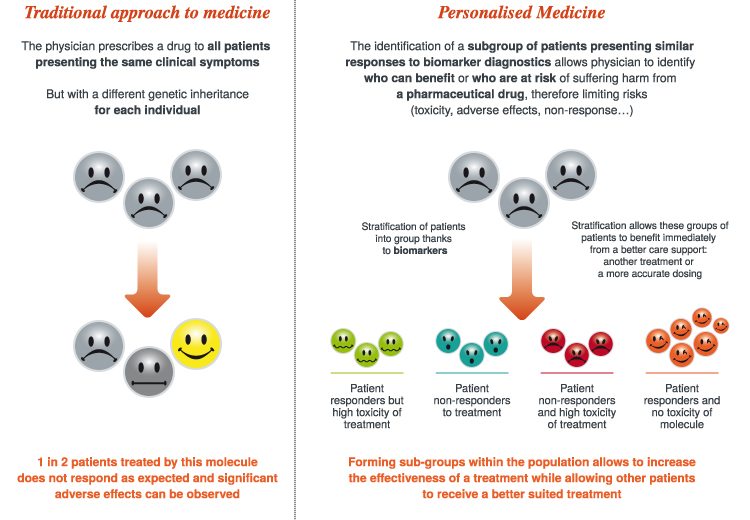The crucial role of diagnostics
Personalised medicine emphasises the systematic use of information about an individual patient to select or optimise that patient's medical care.
Recent innovations in molecular diagnostics have played an important role in improving patient outcomes in a range of human diseases. Jointly with personalised therapeutics, companion diagnostics form the field of personalised medicine, where a person’s clinical, genomic and environmental information is used to more precisely select medication and dose for each individual patient. The application of personalised medicine is likely to improve patient care as well as lower healthcare costs.
Personalised Medicine relies on the use of so-called "companion" biomarkers combined to a treatment.
Advanced molecular and companion diagnostics applications do support physicians in guiding their decisions about the treatment administered to patients, taking into account their individual specificities as well as environmental and clinical parameters. It is well known that patients do respond differently to the same pharmaceutical drug. One subgroup of patients may not respond at all, another subgroup may respond partially whereas a third subgroup may experience adverse drug reactions. One heuristic to find out which subgroup a patient belongs to is trial and error. A trial-and-error approach can be very time consuming, and patients with a life threatening disease may run out of time before the most appropriate pharmaceutical drug is identified (Aspinall & Hamermesh, 2007). The promise of companion biomarkers is the ability to identify patients who benefit or who are at risk of suffering harm from a pharmaceutical drug before treatment even starts, thereby improving patients’health outcomes.
Examples of successful personalised treatments exist in the field of oncology. Measurements of erbB2 and EGFR proteins in breast, lung and colorectal cancer patients are taken before selecting proper treatments. Potential applications of personalised medicine go beyond oncology and touch all chronic health conditions such as, neurodegenerative disease, diabetes, aids, heart disease or mental illness.
As the personalised medicine field advances, tissue-derived molecular information will be combined with an individual's personal medical history, family history, and data from imaging, and other laboratory or genetic tests to develop more effective treatments for a wide variety of conditions.
